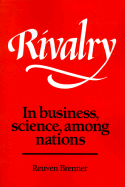Book contents
- Frontmatter
- Contents
- Preface
- Dedication
- 1 Theory of the entrepreneurial firm
- 2 Who are the entrepreneurs? (or, don't confuse brains with a bull market)
- 3 Competition – the leapfrogging game
- 4 Advertising, memory, and custom
- 5 Inventions and innovations in business and science
- 6 Origins of state-owned enterprises
- 7 Restoring the wealth of nations
- Appendixes
- Notes
- References
- Name index
- Subject index
3 - Competition – the leapfrogging game
Published online by Cambridge University Press: 01 June 2011
- Frontmatter
- Contents
- Preface
- Dedication
- 1 Theory of the entrepreneurial firm
- 2 Who are the entrepreneurs? (or, don't confuse brains with a bull market)
- 3 Competition – the leapfrogging game
- 4 Advertising, memory, and custom
- 5 Inventions and innovations in business and science
- 6 Origins of state-owned enterprises
- 7 Restoring the wealth of nations
- Appendixes
- Notes
- References
- Name index
- Subject index
Summary
The reasonable man adapts himself to the world: the unreasonable one persists in trying to adapt the world to himself. Therefore all progress depends on the unreasonable man.
George Bernard Shaw“If you move from third to second in your area, John [Gutfreund, chairman of Salomon Brothers, Inc.] says you're getting there. If you move from second to first, John says you're vulnerable.” … “But that ethos has its drawbacks: Big risks can mean big losses, and Salomon's approach has created a high-pressure environment that alienates some employees” (McMurray 1984). Frito-Lay, a Pepsi Co., Inc., subsidiary that takes in $2 billion on snack food a year, keeps its lead by coming up with new products. What is inspiring the workers to become innovative and look for the perfect snack? George Reynolds, the potato-chip marketing director, puts it bluntly: “I don't want it on my tombstone that I created the first big potato chip since Ruffles. But I do want to get promoted to president.”
These opinions exactly reflect the meaning of competition that emerges from the views presented in Chapter 1: Some entrepreneurs' and managers' conscious driving against both other business firms and against people who work beside them by innovations. Recall, every business was viewed as being organized for exploiting some ideas.
- Type
- Chapter
- Information
- RivalryIn Business, Science, among Nations, pp. 46 - 76Publisher: Cambridge University PressPrint publication year: 1987



